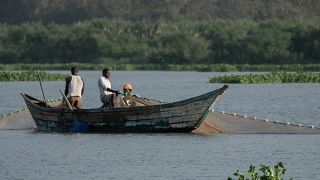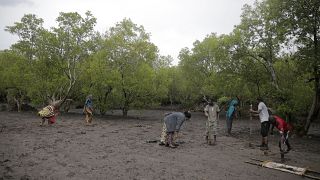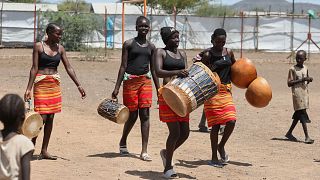Kenya
In Kenya's Amboseli National Park, the drought has killed thousands of wild animals.
It has been one year since the last rain and the signs of devastation are everywhere.
Elephants are one of the species most affected by the lack of water according to thi expert.
"Since June, there’s been a very bad drought because we didn't get enough rain, the long rains, and the short rains. We didn't get enough. So, we have been losing a lot of animals, and elephants have been dying a lot. This is one of the many that have been dying because of the drought", said Norah Njiraini, from the Amboseli Trust for Elephant.
The reserve in southern Kenya is flanked by Mount Kilimanjaro and isn't far from the border with Tanzania.
Kelembu Ole Nkuren is a Maasai shepherd who knows the region well.
"If the drought goes on, it will wipe out the remaining cattle, elephants, all the animals; you can even see the wildebeests are emaciated, and the zebras are dying like cattle. Before the drought, you could see herds of elephants roaming around this neighbourhood, they’re nowhere to be seen now. I am not sure if they died or moved elsewhere", he warned.
Since 2020 that the Horn of Africa region has suffered a severe drought. The lack of water also represents bad news for the country's economy.
"The Kenyan economy depends entirely, in a big percentage, on wildlife tourism.
So, when we have visitors coming to the country, our main backbone economically is basically wildlife tourism. So that when the numbers (of wildlife species, Ed.) depreciate, obviously it becomes the concern of every Kenyan, the concern of every conservation party and even the leadership", said Kenneth Ochieng, Tsavo East National Park director, Kenya Wildlife Service (KWS).
The drought in Kenya has affected around four million people.











02:14
Scientists find way to identify elephant ivory disguised as legal mammoth ivory
01:15
Morocco says 2024 was the hottest year with temperatures reaching 47.7 degrees
01:05
Zimbabwe to cull 50 elephants, distribute meat to locals
00:10
Elephant spotted in Senegalese park gives hope to conservationists
Go to video
To avoid conflicts with locals, Zimbabwe tracks elephants with GPS
01:18
Gaza Crisis: Water shortages worsen